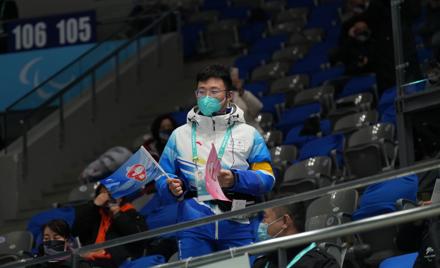Guide the audience to sit down in an orderly manner, hold up signs to remind the audience to wear masks, and carefully clean up the stands after the game... Wang Zibo, a volunteer who participated in the national stadium to participate in the event service, looked no different from ordinary volunteers, in fact, he was a disabled person with hearing impairment.

Wang Zibo, a senior in the Department of Computer Science at Beijing Jiaotong University, has been wearing hearing aids since high school because of his congenital hearing impairment. With "small ears", although he can communicate normally with healthy people, Wang Zibo still encountered obstacles in the Winter Olympics and Paralympic Winter Games.
The main problem is the wearing of a mask. Due to the requirements of epidemic prevention and control, all personnel including staff and spectators must wear masks around the clock. "Because I grew up reading lip language, I can't see everyone's mouth shape now, and the work is very difficult." You can only turn the hearing aid to the maximum, and sometimes you can only try to guess what the other person is saying. Because of this, Wang Zibo said that he also learned some sign language before taking up his post, and carried paper and pen with him, ready to communicate with the audience and help them as much as possible.
With a warm smile and professional service, the audience did not notice the difference between this young man. Until one time, the media came to interview Wang Zibo. The audience saw it, waved at me, and gave me a thumbs up. I was really impressed, the audience was friendly. Wang Zibo said with a smile.
Since january 24, Wang Zibo has been in the venue for more than 40 days. Before each match, he and other volunteers arrive an hour and a half early, and the clearance work after the game lasts from half an hour to an hour. Standing for nearly 4 hours without drinking or sitting, he does not feel hard, the athlete's fighting spirit encourages him, and he also hopes to make a modest contribution.
Compared with last month's Winter Olympics service, Wang Zibo also has a different mood. "Paralympic hockey players are mostly physically disabled, their training is several times more than the healthy athletes, the field is particularly difficult, the collision of ice hockey is particularly intense, but everyone did not give up at all, and fought until the last moment." It also taught me that there are always more ways than difficulties. "This is the first time that the Chinese Paralympic ice hockey team has come to the stage of the Winter Paralympic Games, and they have won two consecutive games in the first two games, and they have won very well. In the second game against the Czech team, both teams had their birthdays and sang birthday songs to celebrate them, which was the touching moment on the field. ”
The guidance in the audience also made Wang Zibo feel the power. "Everyone was enthusiastic, waving the flag and shouting, and some even brought their own flag to cheer." Barrier-free seats have also been added to our venues, and the best seats have been reserved for disabled spectators. When we encounter wheelchair-bound spectators, we will have special volunteers to push them to this area, and the venue also has barrier-free toilets, barrier-free elevators, etc., and the barrier-free streamline is smooth and easy to find. Wang Zibo said that as a disabled person, he deeply feels the warmth and tolerance of the city, and he is very willing to pass on this warmth.